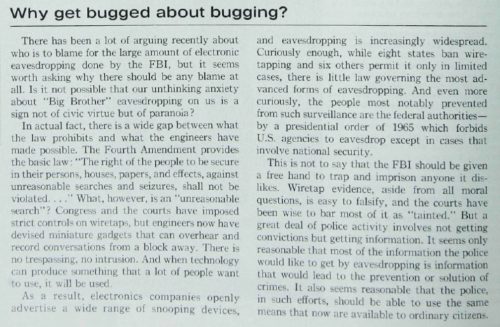“Do You Mind If We Listen?” A Short History of Government Surveillance and the Fourth Amendment
This month marks the fifth anniversary of Edward Snowden’s leak of thousands of classified documents that revealed a number of secret surveillance programs run by the U.S. government. They were intercepting Americans’ phone and internet data on a massive scale, without their knowledge and without warrants. Snowden’s actions created a storm of controversy around the legal and ethical issues of government surveillance. How much of our private information are government agencies entitled to?
When the Fourth Amendment became part of the Bill of Rights in 1791, it prohibited “unreasonable” searches and seizures of property without a proper warrant. But as definitions of property and ways to communicate evolved, no one knew for certain how the Fourth Amendment would be affected. When you made a phone call, for example, was the government allowed to listen in?
In 1928, a man was convicted of bootlegging alcohol based on evidence gathered from a tap on his phone line. The case was appealed to the Supreme Court, which decided that the privacy of phone calls wasn’t protected by the Fourth Amendment. Law officers had seized no property, they pointed out. They hadn’t even entered the defendant’s house. The incriminating telephone conversation existed beyond the protection of the home. That ruling stood for nearly 40 years.
By 1967, the Court’s thinking had changed. That year, the justices heard the case of a man convicted of phoning illegal bets across state lines from a public phone booth. They reversed his conviction, deciding that the Fourth Amendment didn’t just prohibit physical intrusion by the government. It was meant to protect people, not property.
The Saturday Evening Post editors took a different position that year, suggesting that worrying about Big Brother was a sign of paranoia, and that the police should be allowed to eavesdrop because it would be likely to lead to “the prevention or solution of crimes.”

But popular and judicial sentiment was going the other way. In 1972, the Supreme Court reaffirmed their earlier decision, unanimously declaring that the Fourth Amendment prohibited the government from warrantless spying on domestic groups, even when they threatened domestic security. The average citizen was also becoming more aware of the issue, as privacy and wiretaps were in the news that year after the arrest of agents of the Republican Party who were trying to bug the phones in the Democratic Party headquarters at Watergate.
Concluding that government spying had “undermined the constitutional rights of citizens,” the Senate Select Committee on Intelligence was created to regulate surveillance activities. In 1977, the Foreign Intelligence Surveillance Act (FISA) was passed. FISA gave Congress oversight into the surveillance activities of the U.S. government while also maintaining the secrecy needed to carry out these covert operations. A special FISA court was set up to consider requests for surveillance warrants.
Matters might have settled there had it not been for the attacks of September 11, 2001. Congress passed the USA PATRIOT Act that, among other things, expanded domestic surveillance capabilities.
Meanwhile, President George W. Bush authorized a secret intelligence-gathering program through the National Security Agency, circumventing FISA’s authority. In 2005, The New York Times published an exposé of the NSA’s program, which included extensive warrantless tapping of telephones and emails of U.S. citizens. The agency had collected tens of millions of phone records with the help of phone-service providers. In 2007, attorney general Alberto Gonzales told Senate leaders that the NSA program would not be reauthorized.
Two years later, Congress amended FISA with the Protect America Act, which made it easier for government agencies to obtain eavesdropping warrants directed at people “reasonably believed” to be outside the United States. Telecom companies were given immunity from subsequent prosecution for cooperating with the NSA’s program.
In 2013, Edward Snowden, a CIA contractor, leaked classified information about government surveillance. Americans learned that the scope of the government’s electronic spying was far beyond what they imagined. Every day, the NSA received millions of records of phone traffic. It had direct access to Google and Yahoo email accounts, and was connected to the servers of nine major internet firms, including Facebook, Microsoft, and Yahoo.
A federal judge ruled that the NSA’s collection of metadata from phone records violated the Fourth Amendment. He ordered the government to destroy all information gathered, but the action was stayed pending appeal by government attorneys.
Bipartisan reformers, in reaction to these revelations, pushed for a law that limited access to surveillance information. But their efforts failed in January of this year, when the Senate voted for a six-year extension to the NSA’s current surveillance program.
What do most Americans think about the fact that the government might be collecting their internet and phone data? A Pew Research study from 2015 shows opinions are conflicted: 74 percent of respondents said they should not give up privacy and freedom for the sake of safety, while 73 percent said American monitoring of suspected terrorists is okay. Spy on the bad guys, but not on me.
As both threats and technology evolve, we will no doubt continue to wrestle with the balance of privacy versus security, and citizens, lawmakers, and judges will continue to revisit what rights are — or are not — protected by the Fourth Amendment. As scholar Laura K. Donohue expressed it to the Washington Post, surveillance has curious status: “legal — but it’s unconstitutional.”
Featured image: Shutterstock